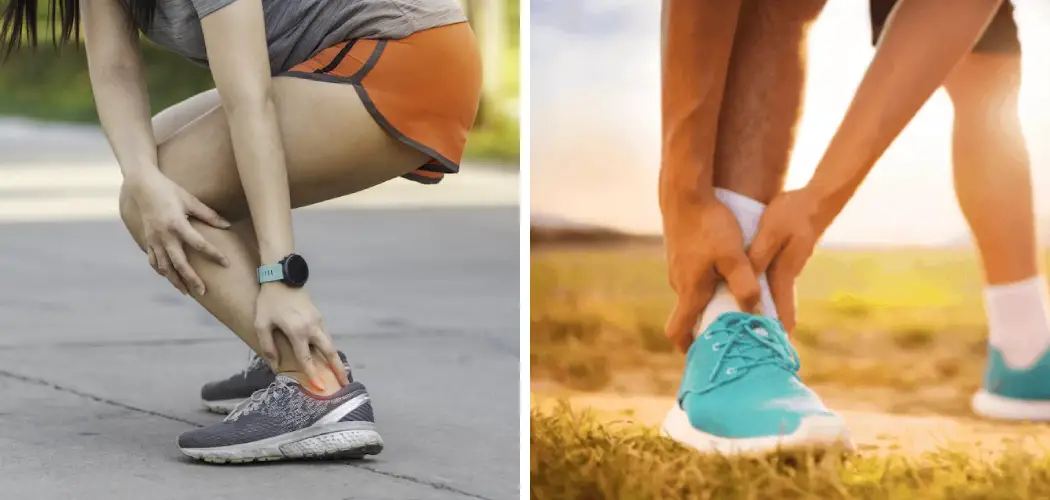Do you have a blister on your Achilles tendon? Are your shoes rubbing against that tender spot every time you walk? You can stop this from happening by following a few simple steps. If you’re a runner, there’s a good chance you’ve experienced the pain of shoes rubbing against your Achilles. This can occur when the shoe is too tight or when the heel is raised too high.
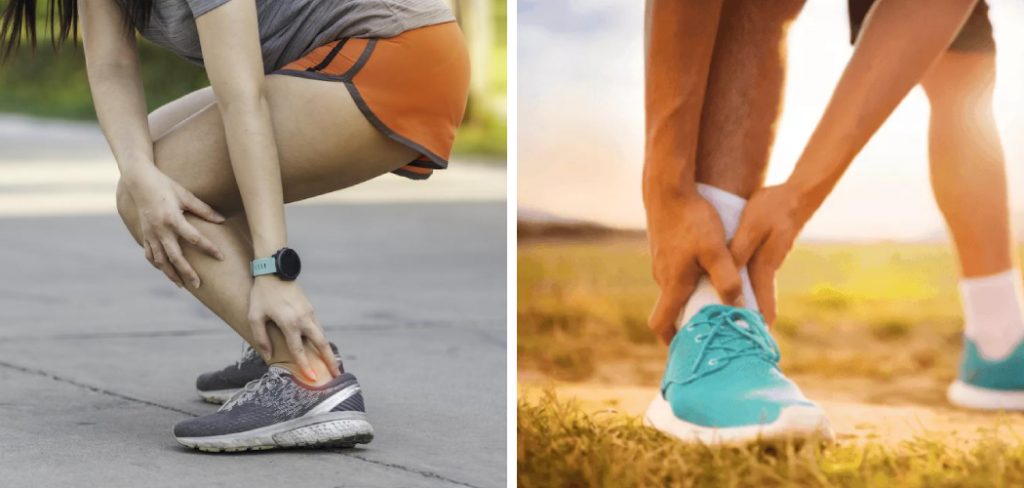
In this post, we’ll provide some tips on how to stop shoes from rubbing achilles. We’ll also discuss the consequences of not addressing this issue and how to prevent it from happening in the first place. So, if you’re experiencing pain from your shoes rubbing against your Achilles, read on for some helpful advice.
What is the Achilles Tendon?
The Achilles tendon is a strong, fibrous cord that connects the calf muscles to the heel bone. It’s responsible for allowing us to point our toes and push off with each step we take. This tendon is crucial in walking, running, and jumping activities.
You can find your Achilles tendon by locating the large, thick cord that runs down the back of your lower leg and connects to your heel bone. It’s a very important part of our anatomy, and when it’s injured or irritated, it can be quite painful.
Five Common Reasons That Causes Rubbing Achilles on Shoes:
1. The Shoes Fit Improperly:
This is the number one reason for shoes rubbing against the Achilles. When shoes don’t fit properly, they can cause blisters and irritation to this sensitive area. To prevent this, it’s important to get fitted for new shoes by a professional at a store. Make sure you try on both the right and left shoes to get an accurate fit.
2. The Shoes are Worn Out:
The soles of shoes naturally wear down over time. This can cause the shoe to rub against the Achilles, leading to irritation and blisters. So, you need to replace your shoes when they start to show signs of wear and tear. If you’re an active person, this may mean replacing your shoes every few months.
3. The Soles of the Shoes Are Defective:
Sometimes, the soles of shoes can be defective and cause them to rub against the Achilles. If you think this might be the case, it’s important to contact the manufacturer and request a replacement. Don’t continue to wear these shoes, as they can cause further injury and discomfort.
4. The Shoes are Too Tight:
If shoes are too tight, they can cause the heel to rub against the Achilles. To prevent this, it’s important to buy shoes that are the correct size. You should also make sure you break in new shoes before wearing them for an extended period. Wearing them for a short period of time each day can help loosen them up and prevent rubbing.
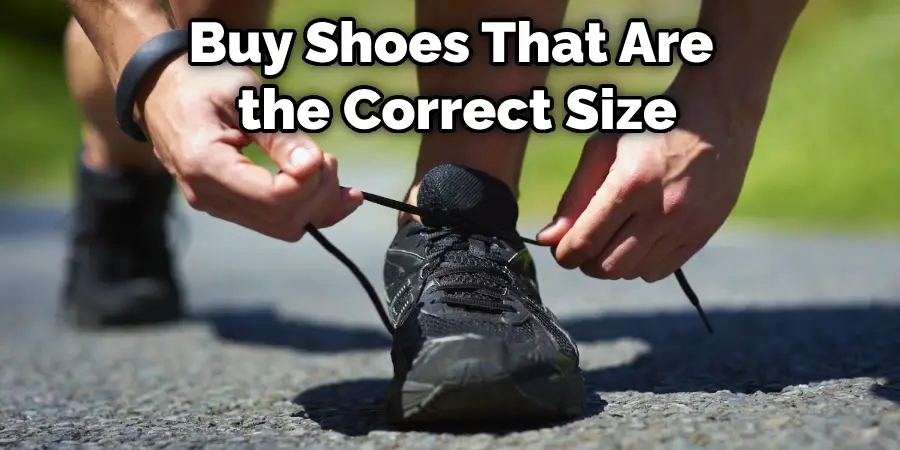
5. You Are Over-Pronating:
If you are over-pronating, this can cause the shoe to rub against the Achilles. Over-pronation is a common problem that can be corrected by using orthotics or by changing your running gait.
If you are experiencing rubbing Achilles on your shoes, try addressing one of these five common causes. However, if the problem persists, it’s important to consult a medical professional for help.
15 Ways on How to Stop Shoes from Rubbing Achilles:
1. Understanding Your Feet Type:
Different shoes are designed for different foot types. Get your feet properly measured and find a shoe made for your type of foot. This will help to stop the shoes from rubbing against your Achilles tendon. It’s also important to consider if you have a high or low arch, as this can also affect the fit of your shoes.
2. Purchase a Perfect Size Shoe that Fit your Feet:
Buying the correct shoe size is essential to prevent any rubbing or chafing against your Achilles tendon. Make sure the shoes you purchase fit comfortably and snugly without being too tight or loose. If the shoe is too small, it will cause your toes to rub against the front of the shoe. A shoe that is too large may cause your heel to move around and rub against the back of the shoe. When trying on shoes, be sure to walk around in them to ensure they are comfortable and provide enough support.
3. Wear Socks that Fit Properly:
In addition to wearing the correct size shoe, it is also important to wear socks that fit properly. Socks that are too tight or too loose can cause rubbing against your Achilles tendon. Instead, choose socks made from a breathable fabric like cotton to help keep your feet cool and dry. The right socks can make a big difference in the comfort of your shoes.
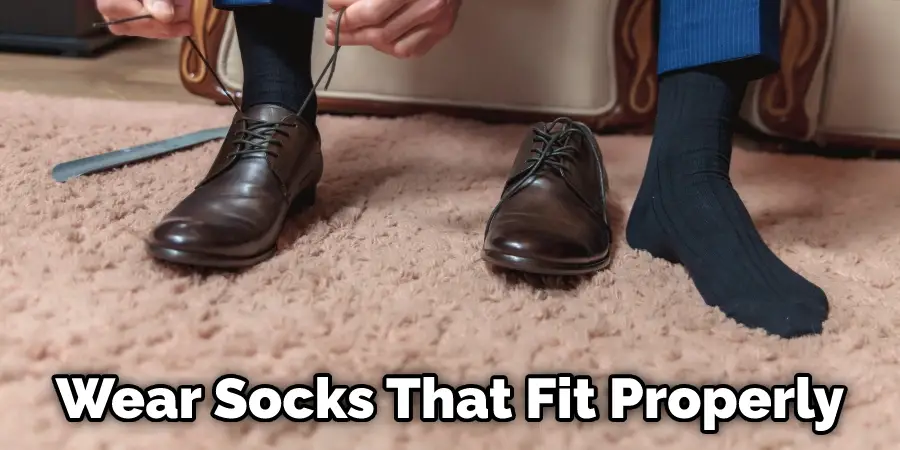
4. Apply a Protective Bandage or Tape:
If you are experiencing any rubbing or chafing against your Achilles tendon, you can apply a protective bandage or tape to help protect the area. There are several different bandages and tapes available that can be purchased at most drugstores or pharmacies. Be sure to select a bandage or tape designed for athletes and made from a breathable fabric.
5. Use a Cushioning Pad:
There are special pads made to cushion the heel and help prevent friction and blisters. These can be purchased at most pharmacies or sporting goods stores. If you are experiencing heel pain, try using a cushioning pad in your shoe. This may help to provide some relief. You can also use gel pads or silicone heel cups to provide extra cushioning and support.
6. Try a Heel Cup:
Heel cups are designed to fit inside your shoe’s heel and help prevent it from rubbing against the back of your Achilles tendon. They come in various shapes and sizes, so you should be able to find one that fits comfortably inside your shoe. You can also try using a gel heel cup for extra cushioning and support.
7. Take Frequent Breaks:
It is important to take frequent breaks whenever you are doing any physical activity. This will help to prevent any pain or discomfort from developing. For example, if you are experiencing any pain or rubbing against your Achilles tendon, stop and take a break. This will give your tendon a chance to rest and will help to reduce inflammation.
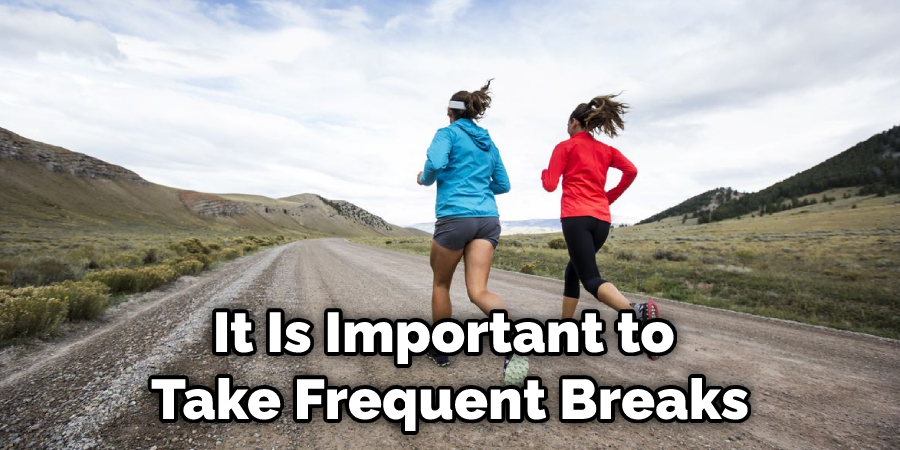
8. Considering the Material of the Shoe:
Not all shoes are created equal. Some materials used in shoes can cause more rubbing against your Achilles tendon than others. If you are experiencing any pain, try switching to a shoe made from a different material. You may find that leather or suede shoes are more comfortable for your Achilles tendon.
9. See a Foot Specialist:
If you are experiencing any pain or discomfort from your shoes rubbing against your Achilles tendon, it is best to see a foot specialist. They can help diagnose the problem and suggest other measures to help prevent the pain from occurring. It is always important to seek medical advice if you are experiencing any persistent pain or discomfort.
10. Use Adhesive like Moleskin:
If you have trouble with shoes rubbing your heel and the solutions above haven’t worked, using an adhesive over the affected area may do the trick. Try moleskin, a sticky, soft fabric that can be found at most pharmacies and drugstores. Cut a piece of moleskin to fit over the heel and attach it to the shoe with tape.
11. Modify Your Activities:
If you are experiencing pain from your shoes rubbing against your Achilles tendon, it is a sign that you should modify your activities. This may mean taking a break from running or playing sports or choosing a different type of shoe to wear for those activities. It is important to listen to your body and make changes as needed to prevent any further discomfort.
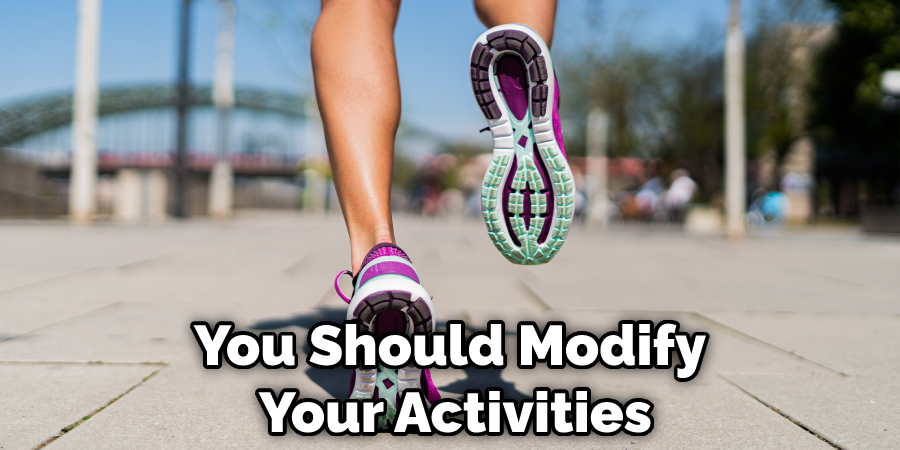
12. Go to the Nearest Cobbler to Fix the Shoe:
If your shoes are constantly rubbing against your Achilles, the best thing to do is go to the nearest cobbler and get them fixed. A cobbler can help you adjust the shoe so that it doesn’t rub against your Achilles as much. They can also provide additional support and cushioning to the shoe to help prevent any further rubbing.
13. Tape the Bottom of Your Shoe:
If you have a really bad shoe-rubbing problem and all the above solutions haven’t worked, try taping the bottom of your shoe. This will help to create a barrier between your shoe and your Achilles tendon. Cut some tape to fit around the heel of your shoe and attach it securely. It may not be the most aesthetically pleasing solution, but it can provide some relief.
14. Walking Around Slowly to Adjust the Shoe:
If you’re having trouble with a shoe rubbing against your heel, the best way to fix it is by walking slowly in the shoe. This will help loosen up the material and adjust the shoe to fit your foot. You can also try wiggling your toes around in the shoe to get it to fit more comfortably. The more you wear the shoe, the more it will adjust and hopefully stop rubbing against your Achilles tendon.
15. Make Hard Leather Shoes Soft with Oil, Vaseline, Alcohol:
Conditioning leather shoes with oil, Vaseline, or alcohol will make them softer and less likely to rub against your heel. First, apply a thin substance layer to the shoe and let it dry. Please do this before you put on the shoes and after being cleaned and dried. Conditioning your shoes every few months should help to keep them from rubbing against your heel.
6 Tips to Stop Shoes from Rubbing the Back of Your Ankle:
Here, we have given tips on how to stop shoes from rubbing achilles.
Tip 1: Wear Socks.
Wear socks to help absorb the moisture and sweat from your feet. This will help keep your feet dry, which will help prevent your shoes from rubbing the back of your ankles.
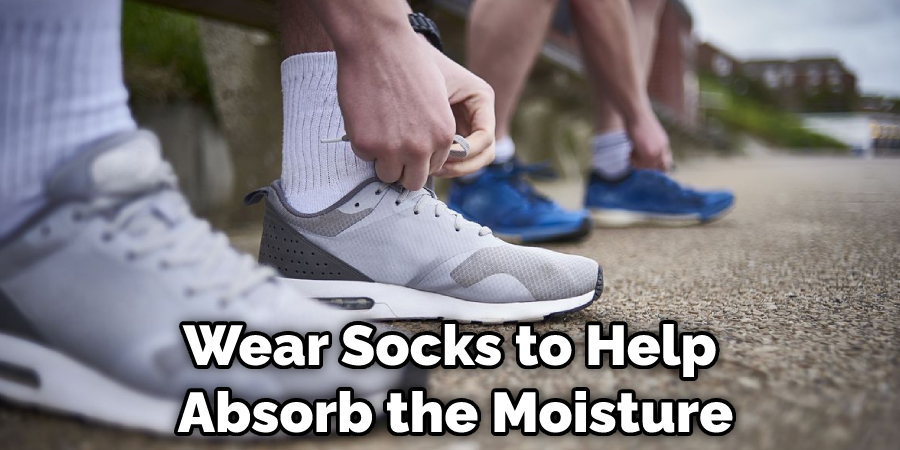
Tip 2: Try Different Shoes.
If you’re having a problem with your shoes rubbing the back of your ankles, try wearing different shoes. Maybe there is something wrong with how the shoes fit you, and by trying a different pair, you will be able to find a pair that doesn’t rub the back of your ankles.
Tip 3: Wear Cushioning.
If you have a problem with your shoes rubbing the back of your ankles, try wearing cushioning on the inside of the shoes. This will help absorb some of the impacts and make your shoes more comfortable to wear. There are various cushioning options available, so you can find one that works best for you.
Tip 4: Tape Your Ankles.
If your shoes are still rubbing against your Achilles, try taping your ankles despite following all the previous tips. First, measure the width of your ankle and then cut a piece of tape that is about two inches wider than that measurement. Next, stick the tape to the top of your shoe’s inner sole right where it meets your Achilles and then stretch it down your ankle. This will help to keep the shoes from moving around and rubbing against your skin.
Tip 5: Use a Heel Gripper.
If you are still having problems with your shoes rubbing the back of your ankles, try using a heel gripper. This is a small piece of rubber or foam placed on the inside of your heel to help keep your heel in place. This will help stop your shoes from slipping and rubbing against your Achilles.
Tip 6: Apply Cream or Ointment.
If you are still experiencing problems with your shoes rubbing the back of your ankles, try applying some cream or ointment to the area. This will help to protect your skin from friction and will help to keep it from becoming irritated.
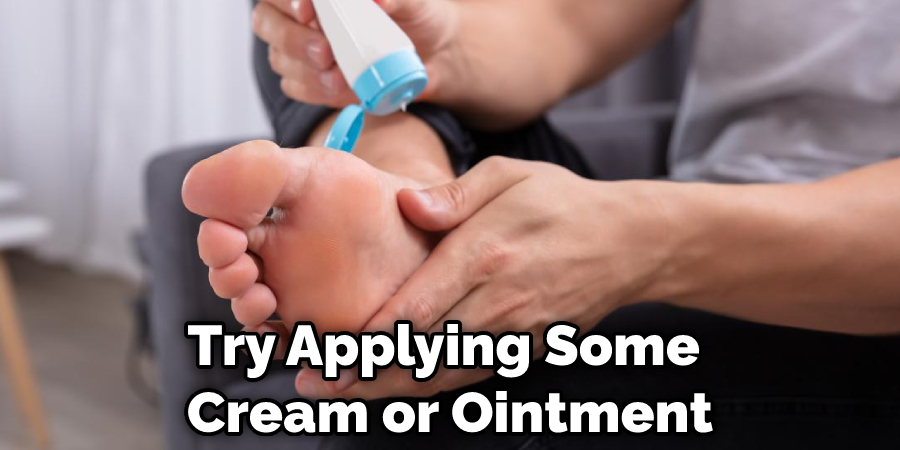
There are many different ways that you can stop your shoes from rubbing the back of your ankles. By following these tips, you will be able to find a way to make your shoes more comfortable and prevent them from causing any irritation or pain.
How to Prevent Your Shoes from Rubbing Your Toes?
If you are having trouble with your shoes rubbing your Achilles, there are a few things that you can do to on how to stop shoes from rubbing achilles. One is to make sure that you are wearing the correct size shoes. Shoes that are too big or too small can cause your toes to rub against the sides of the shoe, which can be very uncomfortable and lead to blisters.
You can also try using inserts or cushioning in the shoes to help absorb some of the impacts and reduce the rubbing. If you are still having problems, you may want to try a different type of shoe altogether. There are many kinds of shoes available on the market today, so you will likely be able to find one that does not rub your Achilles. Finally, if all else fails, you can always try wearing a bandage or wrap around your Achilles to help protect it from the rubbing.
Things to Consider When Choosing Shoes to Avoid Rubbing Achilles:
1. Dual Layering:
Dual Layering is a technique that can be used to help reduce the amount of friction that is caused between two surfaces. This is done by having an inner layer made from a softer material and an outer layer made from a harder material. When properly implemented, this can help cushion the area where the rubbing is taking place and can help to reduce the amount of irritation caused.
2. Proper Fit:
Another thing to consider when trying to avoid shoes from rubbing your Achilles is making sure that you are getting a proper fit. This means ensuring that the shoe is not too tight or too loose.
If it is too tight, this can cause discomfort and can increase the chances of the shoes rubbing against your Achilles. If it is too loose, this can also lead to irritation as the shoe will move around more and may end up rubbing against your Achilles more frequently.
3. Material:
The material of the shoes is also something to consider when trying to prevent them from rubbing your Achilles. Shoes made from a softer material, such as leather, are more likely to irritate shoes made from a harder material, such as plastic or rubber.
4. Heel Height:
Heel height can also play a role in whether or not the shoes rub against your Achilles. For example, heels that are higher than two inches are more likely to irritate heels that are lower than two inches.
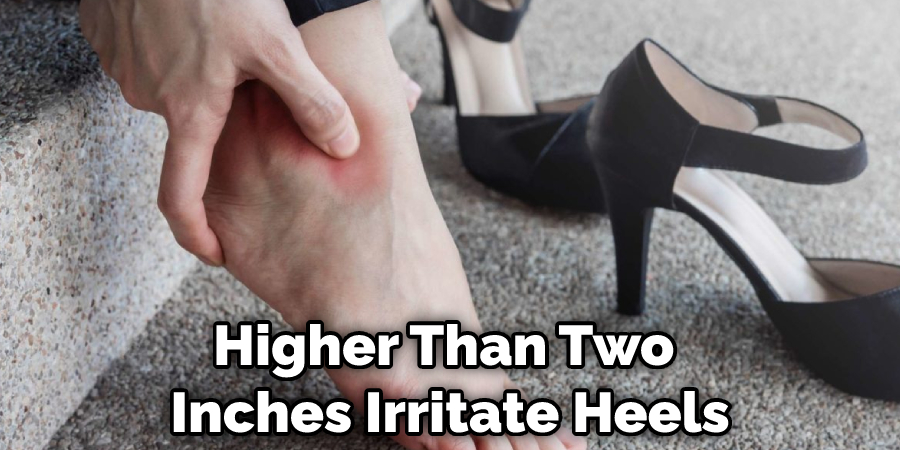
5. Shape of the Shoe:
The shoe’s shape can also make a difference in how often it rubs against your Achilles. Shoes that have a pointed toe, for example, are more likely to cause discomfort than shoes with a rounded toe. Therefore, you may want to consider choosing a more rounded shoe style if you have problems with Achilles rubbing.
6. Tongue Pad:
Some shoes come with a tongue pad that can be inserted into the shoe to help reduce the amount of friction caused. This is a thin piece of foam or rubber that is placed between the tongue of the shoe and your skin. If you are having problems with your shoes rubbing against your Achilles, you may try using a tongue pad to see if it helps.
7. Foot Sleeve:
Another option that can help to prevent your shoes from rubbing against your Achilles is a foot sleeve. This sleeve goes over your entire foot and helps protect it from the friction caused by the shoe. There are many different types of foot sleeves available on the market, so you should be able to find one that will work for you.
8. Cushioning:
If you are still having problems with your shoes rubbing against your Achilles, you may want to try using inserts or cushioning in the shoes. This can help to absorb some of the impacts and reduce the rubbing.
Frequently Asked Questions
Does Vaseline Stop Shoes Rubbing?
There is no definitive answer as everyone will react differently to Vaseline. Some people have reported that using Vaseline in their shoes has helped reduce the amount of rubbing that occurs, while others have said that it made no difference.
If you are experiencing problems with your shoes rubbing against your Achilles, you may try using Vaseline to see if it helps. If not, you can also follow the steps mentioned on how to stop shoes from rubbing achilles to get a better remedy.
Can I Use a Heel Cup to Stop Shoes from Rubbing?
A heel cup is a device inserted into the back of the shoe to provide extra cushioning and support. If you are experiencing problems with your shoes rubbing against your Achilles, a heel cup may be able to help. However, it is important to make sure that the heel cup fits properly to avoid further irritation.
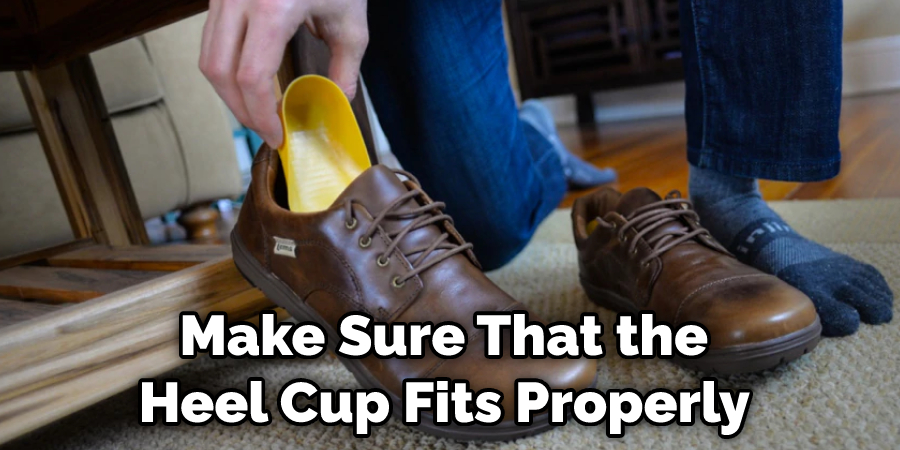
Why Are My Running Shoes Rubbing My Heels?
There are a few potential reasons why your running shoes might be rubbing your heels. The most common one is that the shoes are too tight and are rubbing against your skin. Another possibility is that the insole or lining of the shoe is not fitting well and is bunching up, which is causing friction against your heel. If you have recently switched to a new type of running shoe, it might just take some time for your feet to get used to it and the rubbing will go away.
If you have determined that the shoes are too tight, you can try loosening the laces or buying a half-size larger. If the insole or lining is the problem, you can try replacing it with a new one or cutting it to fit your foot better. If the problem persists after trying these things, it might be time to invest in a different type of running shoe.
Why Do Shoes Always Give Me Blisters?
If you’ve ever had the unfortunate experience of getting a blister on your foot, you know it can be incredibly painful and frustrating. It is physically uncomfortable, but it can also make it difficult to walk or participate in your everyday activities. And if you’re like most people, you probably take your shoes for granted until they start to cause you pain.
The most common cause of foot blisters is shoes that are too tight or that rub against the heel or sides of your feet. Other causes can include high heels, sandals with straps that rub against the skin, and socks or stockings that are too tight or made of a material that irritates the skin.
Conclusion
If you are experiencing pain in your Achilles tendon, it is important to take the necessary precautions to prevent further injury. One way to do this is by wearing shoes that fit properly and don’t rub against the back of your heel. Also, if you have a pair of shoes that are causing pain, try using moleskin or bandages to protect the area.
You may also want to consider purchasing new shoes made specifically for people with Achilles problems. By following these tips on how to stop shoes from rubbing achilles, you can help reduce the risk of developing an infection or other type of injury. If you have any questions or want to know more about the topic, then feel free to comment below!
You May Also Read: How to Stop Shoes Rubbing the Back of Your Heel

